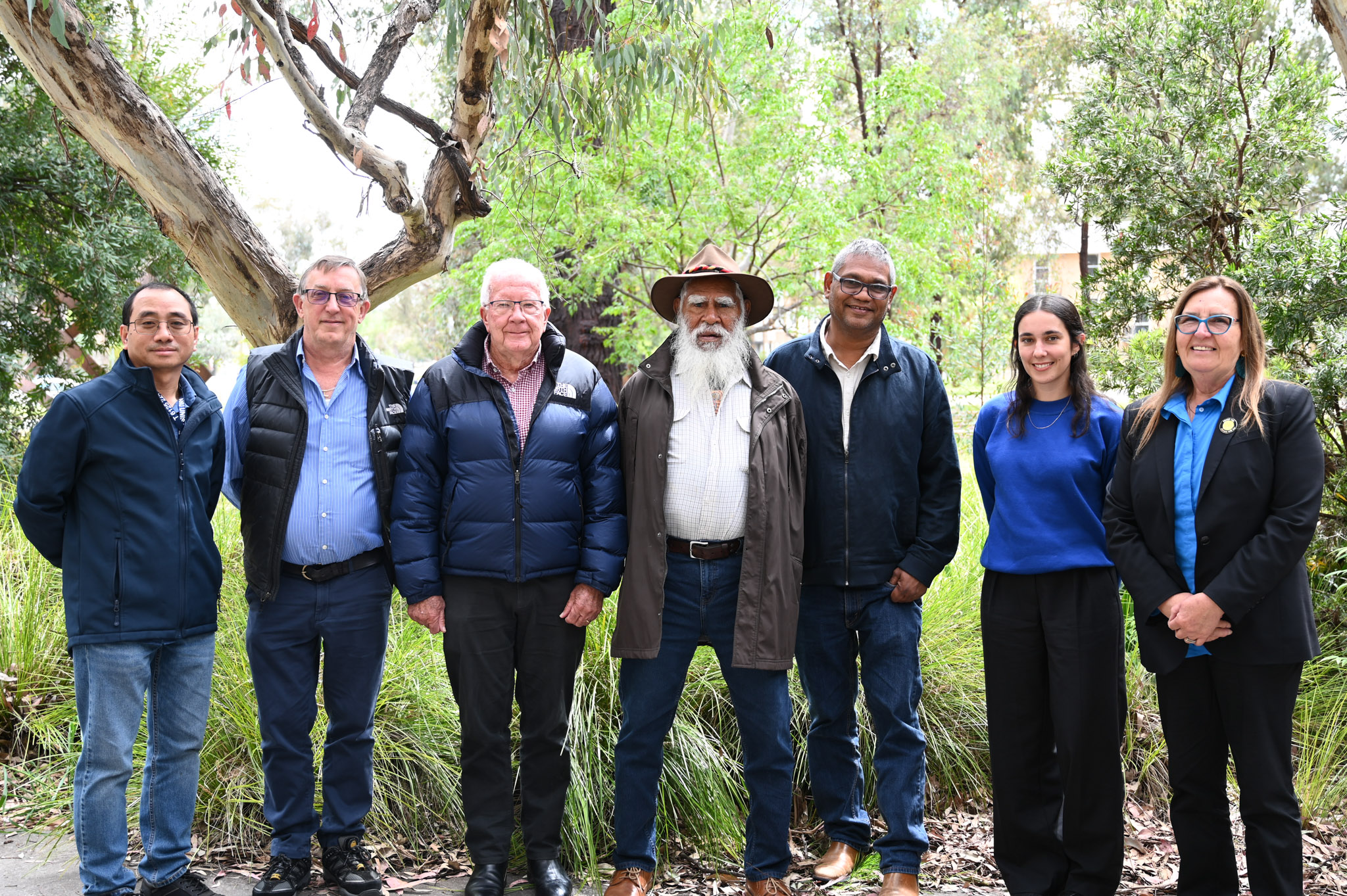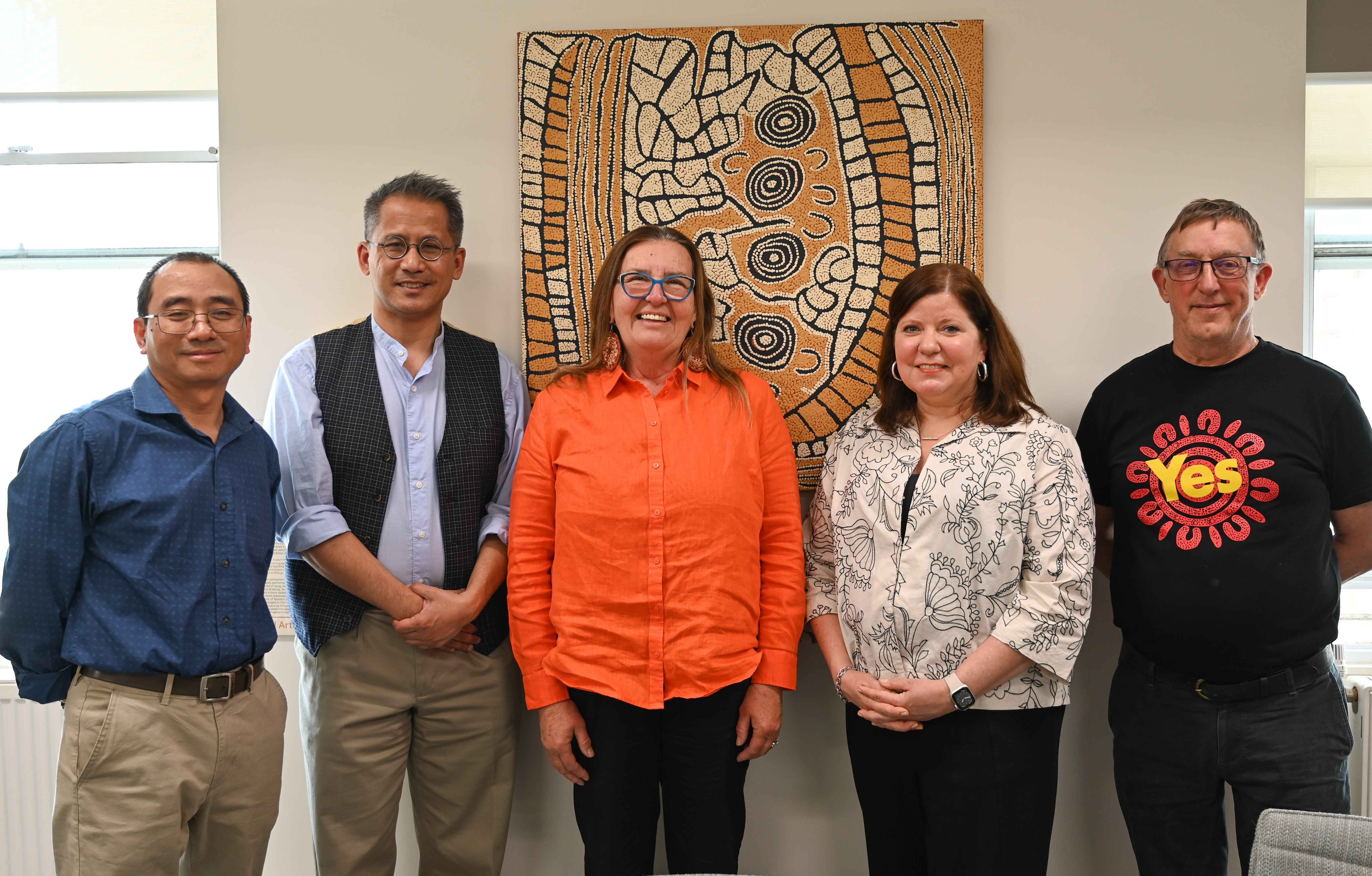News and Events
National Symposium on Australian Traditional Medicine, 11-12 November 2024

National spotlight on Aboriginal medicines research project, 26th October 2023
The collaborative Aboriginal medicines research project between The Australian National University (ANU), Deakin University and Griffith University funded by the Australian Research Council (ARC) received a significant boost with two of the research partners winners of the inaugural ATSE Traditional Knowledge Award.
 John Watson and Professor Ronald Quinn at the ATSE award ceremony
John Watson and Professor Ronald Quinn at the ATSE award ceremonyRenowned natural products chemist Professor Ron Quinn, and Nyikina Mangala senior Elder and traditional knowledge holder Mr John Watson, won the prestigious Award from the Australian Academy of Technological Sciences and Engineering for the research partnership between Kimberley Aboriginal knowledge holders and Griffith University that began 35 years ago and is now continuing through the collaborative ARC research partnership.
The research collaboration that led them to winning the ATSE Traditional Knowledge Award dates back some 30 years and has identified two classes of novel analgesic compounds, one effective for inflammatory pain and diabetic neuropathy and a second which mitigates sciatic nerve injury. Mr Watson’s Traditional Knowledge (TK) of the analgesic plant known as mudjala, which grows along the Fitzroy River enabled Prof Quinn’s research. The mudjala tree is an integral part of the creation story of the Fitzroy River, and although it grows across northern Australia it is only in the West Kimberley where mudjala is known to have powerful painkilling effects. The Nyikina Mangala people are traditional custodians and Knowledge Holders of this information, which has been passed down for generations.
A new research collaboration between the ANU, Griffith University, Deakin University and Nyikina Mangala traditional owners has come about through an ARC-funded Indigenous-led Aboriginal medicines research project. This collaborative project is undertaking further research with the goal of improving the pathways for Aboriginal medicines to gain TGA approval and shifting the mudjala medicine project closer towards commercialisation. Led by ANU School of Regulation and Global Governance’s Dr Virginia Marshall, an Aboriginal lawyer and expert in IP/TK and Indigenous governance, the 3-year ARC project is investigating the barriers and pathways to commercial development of Indigenous traditional medicines.
 Some of the team covening at ANU: (Left to right) Binota Dhamai, Paul Marshall, Ronald Quinn, John Watson, Anthony Watson, Mardi Reardon-Smith, Virginia Marshall
Some of the team covening at ANU: (Left to right) Binota Dhamai, Paul Marshall, Ronald Quinn, John Watson, Anthony Watson, Mardi Reardon-Smith, Virginia MarshallA recent addition to the research team is Binota Dhumai, an ANU early career researcher and former Chair of the UN Expert Mechanism on the Rights of Indigenous Peoples (EMRIP), who has joined the team as a postdoc research fellow focussing on Indigenous governance systems. ANU PhD scholar Paul Marshall, who coordinated the earlier mudjala R&D project on behalf of the Nyikina Mangala senior knowledge holders is documenting the history of the earlier project as well as researching the regulatory frameworks. In the latter he is supported by complementary medicines specialist Chris Oliver, a former R&D manager at Blackmores.
Alfred Deakin Professor Emma Kowal, Deputy Director at the Alfred Deakin Institute for Citizenship and Globalisation and a leading medical anthropologist, is documenting the traditional use of mudjala and the cultural protocols and traditional authorities relating to it, supported by Deakin postdoctoral research fellow Dr Mardi Reardon-Smith.
Senior Aboriginal knowledge holders John Watson and Annie Milgin are working with the research team as Indigenous Research Collaborators to guide the researcher’s engagement with traditional knowledge holders from Nyikina Mangala and a number of West Kimberley language groups as a key part of documenting the mudjala use and cultural authorities relating to it.
Professor Sheryl Lightfoot visiting ANU, 13th October 2023
Professor in Political Science, First Nations and Indigenous Studies at the University of British Columbia, Sheryl Lightfoot, gave a presentation at the ANU School of Regulation and Global Governance on 12 October outlining the steps being taken in Canada to implement the UN Declaration on the Rights of Indigenous Peoples (UNDRIP). Professor Lightfoot is a leading global expert on global Indigenous politics and in 2021 became the first Indigenous Canadian woman appointed to the UN Expert Mechanism on the Rights of Indigenous Peoples (EMRIP) and this year became EMRIP Chair.

ARC project postdoc Binota Dhamai, ANU College of Law Assoc Professor Jonathan Liljeblad, CIA Dr Virginia Marshall, Professor Sheryl Lightfood and PhD scholar Paul Marshall.
Professor Lightfoot’s presentation traced the history of UNDRIP, from 30 years of grassroots Indigenous activism and 20 years of intense international negotiations which eventually led to the UNDRIP’s passage through the UN General Assembly in 1977. The four countries that opposed UNDRIP in 1977 – Canada, Australia, New Zealand, and USA – have all since become signatories. Unlike Australia, that has been slow to align its legislative and policy frameworks with UNDRIP, Canada has been moving strongly to embrace UNDRIP into law and policy at all levels of government.
A key step in Canada’s embrace of Indigenous rights and interests set out in UNDRIP was the Truth and Reconciliation Commission, established by the Canadian government with a 5-year mandate to reveal the truth of colonisation and provide guidance on the path forward. The Truth and Reconciliation Commission reported in 2019 with 94 ‘Calls to Action’ of which twelve referred to UNDRIP with Call #43 for Canada to fully adopt UNDRIP as a framework for reconciliation at all levels of government.
In 2019 British Columbia unanimously passed the DRIP Act which sets out the pathway for UNDRIP implementation in BC enshrining the principles of co-development and co-design of the implementation plan. Since then, 89 shared reports have been released in BC, including annual reports. Nationally, in 2021 the Canadian parliament passed Bill C-15 which affirmed the legal importance of UNDRIP to Canada, committed to Implementation Plans and a National Action Plan, committed to a full review of all federal laws for consistency with UNDRIP and the production of annual reports. The National Action Plan tabled in 2023 included the call for an independent body to resolve disputes.
Professor Lightfoot reported that huge changes were happening throughout Canada as local governments, universities, Indigenous nations, and civil society embraced UNDRIP. Some examples she gave included:
-
The unanimous decision by the city of Vancouver
to implement UNDRIP into all their operations,
-
The Indigenous Strategic Plan 2020 adopted by
the University of British Columbia (https://isp.ubc.ca/)
which has led to the establishment of a network of advisory committees throughout
the university and policies that permeate through UBC at all levels,
-
Across Canada almost all law schools now mandate
UNDRIP training for their law students,
-
Indigenous nations are incorporating UNDRIP into
how they engage with governments, and
-
The establishment of the Coalition for Human
Rights of Indigenous Peoples that brings together Indigenous and non-Indigenous
NGOs to create a range of resources from factsheets, reports, discussion papers
and videos. (https://www.declarationcoalition.com/)
Professor Lightfoot reported a significant increase in the judicial decisions that cite UNDRIP, indicating that the jurisprudence that is being created by Canadian courts will, in time, start to flow through to other common law countries such as Australia.
We acknowledge all Aboriginal and Torres Strait Islander Custodians of Country and recognise their continuing connection to land, sea, culture and community. We pay our respects to Elders past, present and emerging.